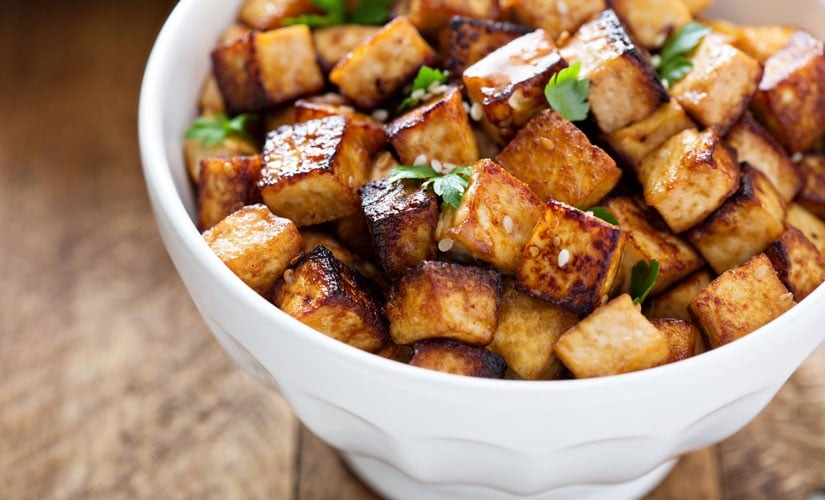
Now that the elaborate, "rich" Christmas feasts and the holiday desserts are behind us, weight loss is the most common New Year’s resolution on everyone’s mind. Yet few people actually succeed in achieving their weight loss goals. The collective failure to lose weight has made America the world's leading nation in obesity.
So this year, rather than just make a lofty goal to lose weight for a couple weeks in January, we suggest trying something different. Put aside the restrictive diets that leave you starving and the quick-fix weight loss plans that are hard to keep. Instead, commit to making lifestyle changes that will not only help keep the weight off, but also improve your overall health at the same time.
Make lifestyle changes by eating more plant-based food. Usual diet plans focus on portion control and calorie counting methods that don’t address the main cause of permanent weight gain: the typical western diet, heavily animal-based and high in processed foods. Cutting the portions with this type of diet leaves a person always feeling hungry, which is why most people can only do it short-term.
By eating more whole, plant-based foods, there is no need to count calories or worry about portion size. A balanced plant-based diet is high in vegetables, fruits, whole grains, and legumes. These foods are rich in vitamins, minerals, and disease-fighting phytonutrients. Not to mention they are naturally low in calories and fat, and high in the antioxidants and fiber that are associated with weight loss.
In a recent study from Loma Linda University, researchers showed an association between diet type and weight, with vegetarians having a lower body mass index (BMI) than non-vegetarians. Interestingly, this association was found despite both groups in the study consuming similar amounts of calories.1
The study, published in the Journal of the Academy of Nutrition and Dietetics, found that average BMI was lowest among vegans (who eat only plant-based food), while average BMI was highest among those who ate meat. Looking specifically at obesity (defined as having a BMI over 30), researchers found that vegans had the lowest percentage -- just 9.4 percent -- while those who ate meat had the highest percentage of obesity -- 33.3 percent. About 24 percent of semi-vegetarians were obese, 17.9 percent of pesco-vegetarians (include fish) were obese, and 16.7 percent of lacto-ovo (include dairy and eggs) vegetarians were obese. This study supports the previous research findings that plant-based foods help facilitate weight loss. It’s important to note that even though the calorie intake was similar in all groups, the differences were in the types of nutrients consumed. Meat-based diets are low in plant proteins, beta carotene, fiber, and magnesium, and they are high in heart disease-linked fatty acids.
In addition to weight loss, a plant-based diet provides many long-term health benefits. A diet rich in plant food helps reduce the risk for heart disease, stroke, high blood pressure, high cholesterol, and diabetes.2 According to the American Institute for Cancer Research, “A predominantly plant-based diet is one of the key elements in recommendations to reduce cancer risk.”3
The take-home message is that you can naturally lower your calorie intake by replacing a meat-based diet with a predominately plant-based one. So you don’t have to eat less to lose weight! Just be sure your veggie-derived meals are made from whole, nutrient-rich foods, not processed "junk food" like vegan versions of hot dogs, cookies, and donuts. Make sure to check out this issue's Health Tip on resources for great plant-based recipes!
Try to follow the Plate Method. Even if you follow this method only 60-70% of the time, it will have a positive impact on weight loss and overall health:
- Make half your plate non-starch vegetables such as spinach, kale, lettuce and other leafy greens, eggplant, broccoli, zucchini squash, mushrooms, onions, green beans, sprouts, tomatoes, carrots, cauliflower, cucumbers, peppers, etc.
- Make a quarter of your plate whole grains (or starchy vegetables) such as brown rice, quinoa, sweet potatoes, buckwheat, oats, and bulgur.
- Make the other quarter plant-proteins such as lentils, tofu, tempeh, vegetarian refried beans, black beans, kidney beans, green peas, garbanzo beans (and hummus), soybeans (edamame); or smaller portions (2 Tablespoons) of almonds, walnuts, cashews, chia seeds, hemp seeds, sesame seeds (and tahini), nut butters (peanut, almond, or cashew butter). Those of you who worry about getting enough protein from a plant-based diet might like to check out an article I wrote about it, "The Great Protein Myth."
Natural organic dairy products such as milk, yogurt, kefir, cottage cheese, or cheese can be a healthy part of a plant-based diet when consumed in moderation.
- Rizzo, Nico S. et al. Nutrient Profiles of Vegetarian and Nonvegetarian Dietary Patterns. Journal of the Academy of Nutrition and Dietetics, Volume 113, Issue 12, 1610 - 1619.
- Francesca L Crowe, Paul N Appleby, Ruth C Travis, and Timothy J Key. Risk of hospitalization or death from ischemic heart disease among British vegetarians and nonvegetarians: results from the EPIC-Oxford cohort study. Am J Clin Nutr, January 30, 2013 DOI: 10.3945/ajcn.112.044073
- American Institute for Cancer Research. Eating Patterns to Lower Cancer Risk: More than One Route to a Plant-Based Diet. Retrieved on December 16, 2014.